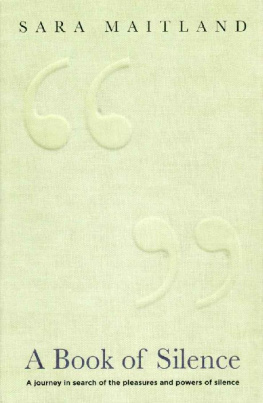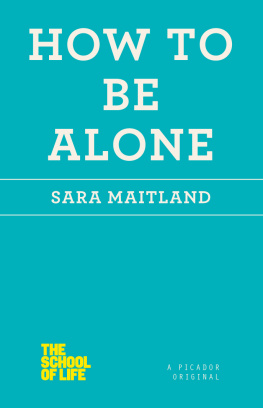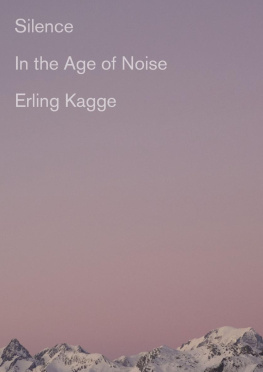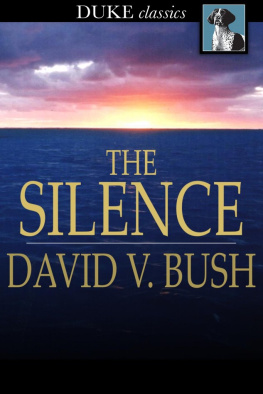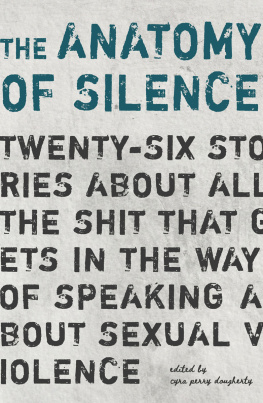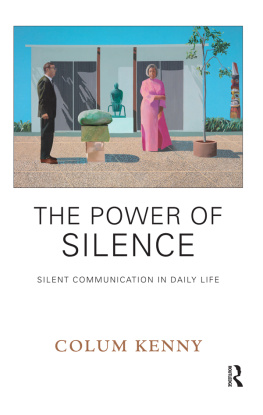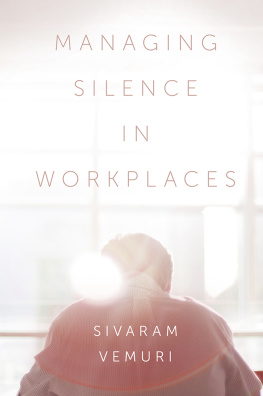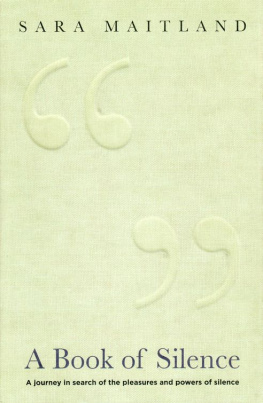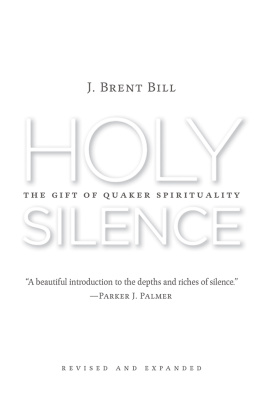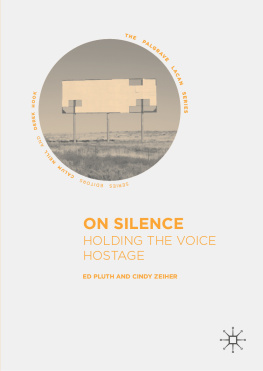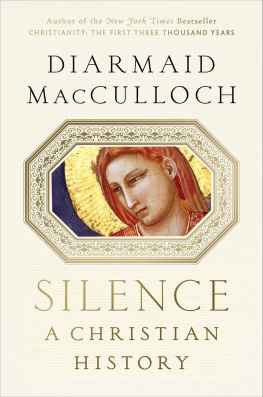In Maitlands hands, silence turns out to be another entire, psycho-geographical world laid alongside the one we know and hear and yack about so much. I learned to tell when it had been snowing in the night by the quality of silence her book is full of such moments, articulating the common but usually ignored and unexpressed experiences in our lives Spectator
A healing book about the pleasures to be found alone and how solitude can set you free Red
Refreshing, insightful, strangely touching and bound to make you want to haul yourself off that sofa in search of a life-affirming journey Wanderlust
Extraordinary Maitland is blazingly intelligent, and committed to rigorous, interrogative scholarship a justified and valiant response to the widespread frenzy and mindlessness of 21st century life Sunday Business Post
[Sara Maitland] is right to think that silence is a deep need, ever less honoured in our lives Evening Standard
Fascinating raises many interesting philosophical questions Sunday Times
An extraordinary book in our noise-saturated culture Chosen by the Kew Bookshop in London in the Independent on Sunday
Her artful book, mixing autobiography, travel writing, meditation and essay, describes her route away from urban brouhaha towards increased solitude Her book demands to be taken on its own terms as the vision of a highly educated contemplative who is alert to Western cultures distrust of loners Independent
Maitland is a bold adventurer and the rest of us, doubtless ill-equipped to deal with the emotional and intellectual challenge of self-sought solitude, are lucky she can give the condition of silence such an articulate voice Metro
By the end of her brave, honest, fascinating book, one respects her choice of lifestyle, the determination it has taken to bring it about and the sacrifices it has engendered Scotsman
Offering at once personal anecdotes, cultural diagnoses and soothing antidotes, these memoirs make for a timely and nourishing read List
The pursuit [of silence] is described with fervour and intelligence that make this book full of insights and explorations, oddities and quirks about the natural world (some dazzling descriptive passages), about silence in several cultures, about the choice of where to live, about routines, satisfactions, happiness Tablet
You cant help warming to Sara Maitland Maitland is a rottweiler of enthusiasm who pursues her ideas to the end, eloquently and learnedly, and nowhere more than in this, her latest work Irish Times
Her dedication to the cause is both inspiring and shocking There are many beautiful meditative passages in her meditation on silence [A] wonderful salutary book Sunday Telegraph
A B OOK OF S ILENCE
Sara Maitland
GRANTA
For Janet Batsleer and John Russell
for reasons best buried in silence
Table of Contents
Growing up in a Noisy World
I t is early morning. It is a morning of extraordinary radiance and unusually up here there is practically no wind. It is almost perfectly silent: some small birds are chirping occasionally and a little while ago a pair of crows flapped past making their raucous cough noises. It is the first day of October so the curlew and the oystercatchers have gone down to the seashore. In a little while one particular noise will happen the two-carriage Glasgow-to-Stranraer train will bump by on the other side of the valley; and a second one may happen Neil may rumble past on his quad bike after seeing to his sheep on the hill above the house; if he does he will wave and I will wave back. That is more or less it.
I am sitting on the front doorstep of my little house with a cup of coffee, looking down the valley at my extraordinary view of nothing. It is wonderful. Virginia Woolf famously taught us that every woman writer needs a room of her own. She didnt know the half of it, in my opinion. I need a moor of my own. Or, as an exasperated but obviously sensitive friend commented when she came to see my latest lunacy, Only you, Sara twenty-mile views of absolutely nothing!
It isnt nothing, actually it is cloud formations, and the different ways reed, rough grass, heather and bracken move in the wind, and the changing colours, not just through the year but through the day as the sun and the clouds alternate and shift but in another sense she is right, and it is the huge nothing that pulls me into itself. I look at it, and with fewer things to look at I see better. I listen to nothing and its silent tunes and rhythms sound harmonic. The irregular line of the hill, with the telegraph and electricity poles striding over it, holds the silence as though in a bowl and below me I can see occasional, and apparently unrelated, strips of silver, which are in fact the small river meandering down the valley.
I am feeling a bit smug this morning because yesterday I got my completion certificate. When you build a new house you start out with planning permission and building warrant, and at the end of it all an inspector comes to see if you have done what you said you would do and check that your house is compliant with building regulations and standards. Mine is; it is finished, completed, certified. All done and dusted. Last night I paid off my builder, and we had a drink and ended a year-long relationship of bizarre intensity, both painful and delightful. Now I am sitting and regathering my silence, which is what I came here for in the first place.
Three minutes ago it is pure gift, something you cannot ask for or anticipate a hen harrier came hunting down the burn, not twenty metres from the door. Not many people have a hen harrier in the garden. Hen harriers are fairly rare in the UK, with slightly over a hundred breeding couples mostly in the Scottish Highlands. They are slightly smaller and much lighter than buzzards, and inhabit desolate terrain. Male hen harriers, seen from below, look like ghosts pure white except for their grey heads but with very distinct black wing tips. They hunt low and glide with their wings held in a shallow V; powerful hunters, beautiful, free. I do not see them very often, but the first time I came to the ruined shepherds house, which is now, today, my new home, there was a pair sitting on the drystone dyke. They speak to me of the great silence of the hills; they welcome me into that silence.
The silent bird goes off about his own silent business, just clearing the rise to the west and vanishing as suddenly as he came. Briefly I feel that he has come this morning to welcome me and I experience a moment of fierce joy, but it rumbles gently down into a more solid contentment. There are lots of things that I ought to be getting on with, but I light a cigarette and go on sitting on my doorstep. It is surprisingly warm for October. We had the first frost last week, light-fingered on the car windscreen. I think about how beautiful it is, and how happy I am. Then I think how strange it is how strange that I should be so happy sitting up here in the silent golden morning with nothing in my diary for the next fortnight, and no one coming and me going nowhere except perhaps into the hills or down the coast to walk, and to Mass on Sundays. I find myself trying to think through the story of how I come to be here and why I want to be here. And it is strange.
I have lived a very noisy life.
As a matter of fact we all live very noisy lives. Noise pollution has settled down into the ecological agenda nearly as firmly as all the other forms of pollution that threaten our well-being and safety. But for everyone who complains about RAF low-flying training exercises, ceaseless background music in public places, intolerably loud neighbours and drunken brawling on the streets, there are hundreds who know they need a mobile phone, who choose to have incessant sound pumping into their environment, their homes and their ears, and who feel uncomfortable or scared when they have to confront real silence. Communication (which always means talk) is the sine qua non of good relationships. Alone and lonely have become almost synonymous; worse, perhaps, silent and bored seem to be moving closer together too. Children disappear behind a wall of noise, their own TVs and computers in their own rooms; smoking carriages on trains have morphed into quiet zones but even the people sitting in them have music plugged directly into their ears.

